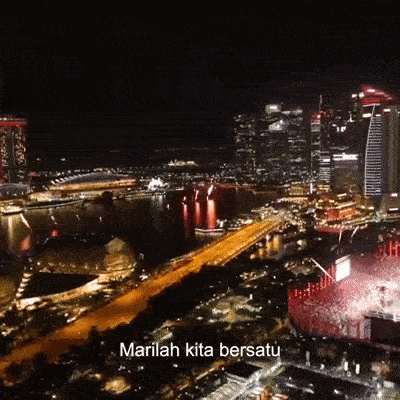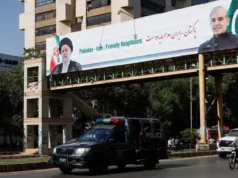Majulah Singapura – 54 Birth Anniversary

Article by Prof Tommy Goh: Onward Singapore
This is a very special year for Singapore. First, we are celebrating the 54th anniversary of Singapore’s independence. Second, we are commemorating the 200th anniversary of the British East India Company setting up a trading post in Singapore. Third, we are also reflecting on our pre-colonial history, which stretches back 700 years to the 14th century.
To help Singaporeans understand the significance of the three events, we have two new books and an enchanting multimedia show, choreographed by Ms Beatrice Chia-Richmond and Mr Michael Chiang, called The Bicentennial Experience, at Fort Canning Centre.
Our eminent historians Kwa Chong Guan, Derek Heng, Peter Borschberg and Tan Tai Yong have written an excellent book, Seven Hundred Years: A History Of Singapore. Former British high commissioner Scott Wightman and I have co-edited a smaller book, 200 Years Of Singapore And The United Kingdom.
TEMASEK, MELAKA AND JOHOR
What lessons or wisdom can we learn from the review of our pre-colonial history?
We learn that Singapore had been settled twice before the arrival of the British. In the 14th century, there was a kingdom on the island called Temasek. It was an autonomous port-city. Temasek thrived on trade and had good economic relations with the Srivijaya empire (based in Sumatra) and the Majapahit empire (based in Java), as well as with China and India.
In the 15th century, Temasek lost its autonomy and became part of the Melaka Sultanate. Melaka was the dominant maritime power in the Strait of Malacca.
When Melaka fell to the Portuguese in 1511, the Sultan of Melaka fled to Johor and established a new sultanate there. Singapore continued to serve the Sultan as a naval outpost and as a centre for trade. The Sultan of Johor was killed by his own noblemen in 1699, and this led to a civil war and the decline of the sultanate. Since Singapore’s fortune was tied to that of the Johor Sultanate, it also declined into insignificance.
LESSONS LEARNT
What lessons can we learn from Singapore’s pre-colonial history?
The first lesson is that contrary to the British narrative, the history of Singapore did not begin in 1819.
The second lesson is that Singapore had always played a role in the maritime trade of South-east Asia and in the East-West trade between China, India and the West. This was and still is the reason for the existence of Singapore.
To maintain this position, we must always have the region’s best seaport, best entrepot port, best shipping hub and best international maritime centre.
The third lesson is that Singapore has to be even more integrated into the region. Our pro-Asean policy, our substantial investments in Asean countries, the help we extend – by government, private sector and civil society – to other Asean countries and their peoples are all laudable.
We can and must do more. We should encourage our students to learn an Asean language and go on exchange programmes to the best Asean universities.
We should encourage our tourists to visit Asean countries. Professor Linda Lim from the University of Michigan has called on Singapore to return to the region. My reply to Prof Lim is that we have never left the region.
However, in a recent survey of the 10 Asean countries, Laotian students topped the list as being the most knowledgeable about Asean and the most pro-Asean. Singapore students came in last as being the least knowledgeable about Asean and the least interested in Asean.
The Singapore Government’s pro-Asean policy must be shared by the business community and by our civil society and young people. This is especially important at a time when certain countries in the West are turning inward. In this increasingly uncertain world, Asean is a bright spot. I think this is the wisdom behind Prof Lim’s statement.
British Rule And Japanese Rule
The British ruled Singapore from 1819 to 1942 and from 1945 to 1963 – a total of about 140 years. Japan ruled Singapore for 31/2 years from 1942 to 1945. I must say in all frankness that Japan left no positive legacy in Singapore, except to show us that the British were not a superior people and had no right to rule over us.
Unlike the Japanese, the British did leave us with a positive legacy.
In my book, I described British rule as 60 per cent good and 40 per cent bad. The good things are well known.
What were some of the bad things? The British were racists and treated us as second-class (Eurasians) or third-class citizens. The British promoted the smoking of opium in Singapore. There was neither democracy nor human rights in colonial Singapore. The British did not diversify the economy and were unable to generate enough jobs for our young people. Most egregious of all, the British failed to defend Singapore against the Japanese invasion.
However, unlike other colonial masters in South-east Asia, the British did leave us with a positive legacy. This includes the English language, the free port, free trade, open economy, good infrastructure, the rule of law, a good civil service and police force, town planning, public hygiene and modern medicine, a belief in science and modernity, and an appreciation of nature and natural history.
The Story Of Singapore
Many former British colonies have squandered their British legacy and are stuck in the Third World. In the case of Singapore, our political leaders took the brave step of accepting our colonial past and building on the British legacy.
In almost every sector, the Government of independent Singapore has improved on what the British had left us. For someone like me, who is in his 80s, what we have achieved in the past 54 years is nothing short of a miracle.
As a first-generation diplomat, I am proud of Singapore’s high standing in the world and the success of its diplomacy. I can understand why Israeli-Palestinian video blogger Nuseir Yassin, also known as Nas, has described Singapore as an “almost perfect country”.
A View From Mexico
I recently met a group of 28 university students from Mexico, who had spent a week in Singapore. I met them on the eve of their departure for home.
At the end of our dialogue, one of the teachers asked each student to think of a word to represent their impressions of Singapore. Several chose the word “innovation”. The other words were “clean”, “honesty” and “harmony”. The last student said, “utopia”.
I thanked all the students for their favourable impressions of Singapore. I told them that although we have done well, we are not perfect and there are areas which need improvement. My answer to Mr Nicholas Walton, the author of Singapore Singapura: From Miracle To Complacency, is that far from being complacent, the leaders of Singapore are paranoid, constantly worrying about threats to our security and prosperity.
My Wish List
I have a wish list for the future of Singapore.
First, on the economy. I would like to see our economy continue to grow at a sustainable rate, focusing on knowledge-intensive and creative industries, green technology, green finance and other environmentally friendly business. I would like to see Singapore become one of the world’s leading incubators of inventors, start-ups and innovators. I am confident that Singapore will succeed in the Fourth Industrial Revolution, but we should take care of workers who will be displaced by the revolution in manufacturing, retail, banking and other sectors.
Second, on the environment. We should be bolder in our efforts to make Singapore a clean, green, liveable and delightful city. We should progressively replace our existing buses, taxis, government-owned and private vehicles with electric vehicles. We should promote the wider use of solar power and the building of more net-zero energy buildings. We should impose a tax on bottled water and single-use, non-biodegradable plastic. We should emulate the example of Japan, South Korea and Taiwan in the recycling of waste.
Third, on equality. We should reduce the number of Singaporeans living in absolute poverty – mostly the elderly poor – to zero.
We should have the courage to follow the international best practice and set the poverty line at 50 per cent of our median income, which would be $2,200, and ensure that our workers earn wages above the poverty line. The Government should ensure that workers under the Progressive Wage Model and the Workfare Income Supplement earn wages above the poverty line.
Fourth, on justice. We should raise the retirement age to 70 because most Singaporeans enjoy good health up to the age of 70, and combat all forms of ageism in Singapore. We should raise the percentage of our disabled in employment, from the current 5 per cent to 40 per cent. We should accept the LGBT (lesbian, gay, bisexual and transgender) community as full members of the Singapore family and end all forms of discrimination against them.
Fifth, on democracy. We should have an ombudsman to enhance transparency and accountability. We should accept the right of all citizens, including intellectuals and artists, to hold alternative or dissenting views. We should strengthen the culture of respecting different points of view, including those with whom we disagree. This is the essence of democracy.
MESSAGE FROM THE BICENTENNIAL EXPERIENCE
At the end of The Bicentennial Experience, visitors were asked to vote on which of the following three options was most important to Singapore: (a) openness, (b) multiculturalism, and (c) self-determination.
By a big majority, the choice was self-determination. The message is clear. Singaporeans do not wish to be ruled by Johor, London, Tokyo or Kuala Lumpur. They want to be the masters of their own destiny.
•Professor Tommy Koh, a veteran diplomat, is rector of Tembusu College, National University of Singapore.



